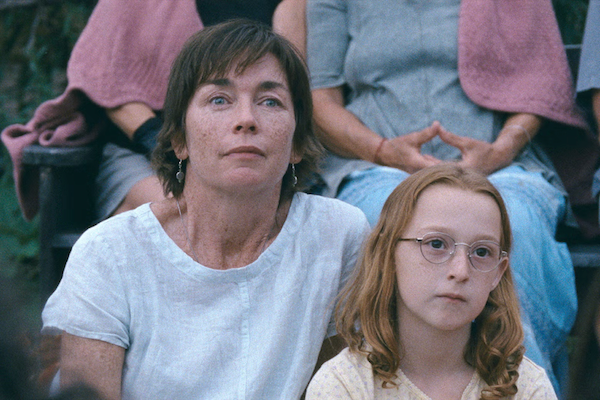Movie review by Greg Carlson
The Pulitzer Prize-winning playwright Annie Baker makes an auspicious feature directorial debut with the bracing and stimulating coming-of-age story “Janet Planet.” Focusing on the microscopic details of a complex mother-daughter relationship, the movie is now available to rent on major streaming services following a theatrical run. Baker’s transition from the stage to the screen proves to be a best-of-both-worlds proposition; “Janet Planet” relies on precise language that hides layers of meaning beneath the crust of what might otherwise appear to be the common and mundane speech of the everyday. And yet, Baker also knows the cinematic ingredients that make a great piece of visual storytelling.
The terrific Julianne Nicholson plays a single mom making a living as an acupuncturist in rural Massachusetts in 1991. Watched closely by her 11-year-old daughter Lacy (newcomer Zoe Ziegler in an absolutely devastating performance), Janet seeks to sustain a meaningful romantic partnership with the taciturn Wayne (Will Patton), who does not seem particularly pleased when Lacy returns from summer camp early. Baker allows viewers to fill in many blanks, but it doesn’t take long for us to see that an unfulfilled and restless Janet moves from one romance to the next. The insertion of title cards signaling the ends and beginnings of several key satellites in Janet’s life confirms our suspicions.
The live-in visitors will come and go without any real fanfare or antagonism or even visible conflict (Justin Chang suggests that Baker is “allergic to melodrama”), but Lacy is the moon that orbits her mother’s sun with superglued fidelity composed of parental bonds and the complete dependence of children on their adult caretakers. One of the most deeply satisfying aspects of “Janet Planet” is the way Baker catches the lightning of a very wise, very intuitive, very mature human being who is still just a kid slipping toward that point of no return when many aspects of innocence vanish all at once. Janet talks to Lacy with unvarnished sophistication frequently reserved for grown-up peers. If Lacy asks a question, Janet answers it honestly.
There are any number of films and filmmakers that come to mind when searching for points of comparison. In terms of milieu and the breathing-room quietude so savored by the director, though, “Janet Planet” strongly resembles the worlds of Kelly Reichardt, an artist who knows a thing or two about what to illustrate and what to obscure. Janet, like her daughter, contains multitudes and plenty of contradictions. She yearns for love but doesn’t choose good partners. She’s driven to earn the credential and licensure that allows her to run a small business but she hovers on the fringes of post-hippie free-spiritedness. In one exchange both curious-funny and ha-ha-funny, Janet wonders aloud whether the collective to which new beau Avi (Elias Koteas) belongs is more or less a cult.
Lacy is every bit as critical to the story. One could make a strong argument that Baker aligns perspective and point of view with this younger character more than she does with the one whose name appears in the title. Ziegler is consistently amazing, putting together a wide array of emotions to define her character’s liminality. Despite her desire to cling to Janet with all her might, Lacy is often seen passing time by herself, arranging the eclectic collection of small figurines in her bedroom dollhouse or practicing for a piano lesson while Janet is seeing clients. As the movie draws to a close, Baker calls on Ziegler for a transcendent moment that should be talked about with the same reverence that frequently described a certain close-up of Timothee Chalamet in “Call Me by Your Name.”
